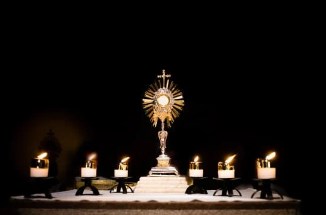
Actually, technically speaking, it is possible for a lay person to have the blessed sacrament kept in his or her place. What is required is to obtain permission from the diocese.
For a local bishop to approve the blessed sacrament to be kept in a location, a number of things need to be secured. I’m not the expert here, so it is best to get the full requirement from your local diocesan office.
– the blessed sacrament needs to be protected from theft and sacrilegious abuse to the bishop’s satisfaction; usually that means the tabernacle is secure with locks and trustworthy persons are responsible for its safety all the time.
– proper liturgies are conducted regarding its celebration; there is no truly “private” reservation of the sacrament (as for one or two individuals), masses should be celebrated from time to time, people should be able to adore the Lord there. So there can be reservation for seminaries, oratories, convents, monasteries, religious houses, bishop’s residence, but almost never for a lay household unless they have a properly appointed chapel that can be used for some occasional liturgies.
– where the sacrament is kept, should be a place of prayer and adoration, separated from other usage. A priest should be responsible for ensuring the host is consumed and replaced from time to time.
And probably more that skip my mind right now.


